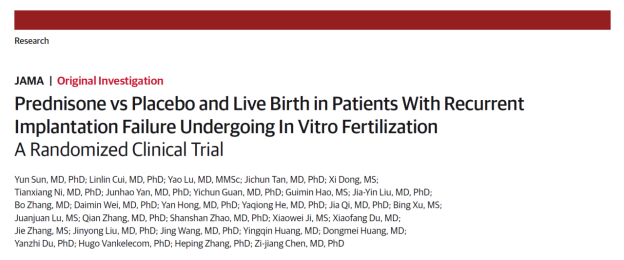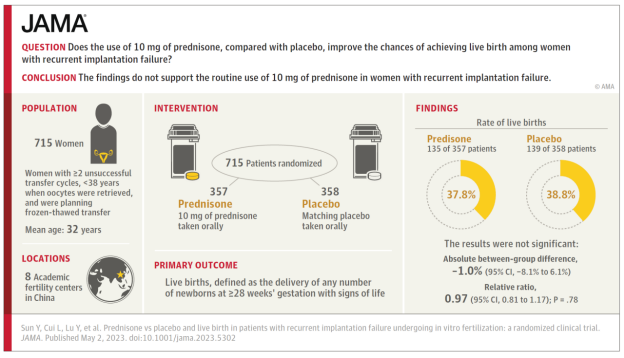On May 2rd, 2023, the Journal of the American Medical Association (JAMA), one of the world's top academic journals with an impact factor of 157.335, published the results of a multicenter, randomized, double-blind, placebo-controlled clinical study entitled "Prednisone vs Placebo and Live Birth in Patients With Recurrent Implantation Failure Undergoing In Vitro Fertilization", jointly conducted by Academician Zi-jiang Chen and Professor Yun Sun's team from the Reproductive Medicine Center of Ren Ji Hospital affiliated to Shanghai Jiao Tong University School of Medicine, Reproductive Medicine Center of Shandong University, Shengjing Hospital of China Medical University, Zhongshan Hospital affiliated to Fudan University, the Third Affiliated Hospital of Zhengzhou University, the Second Hospital of Hebei Medical University, Jiangsu Province Hospital, and Maternal and Child Health Hospital/Obstetrics and Gynecology Hospital of Guangxi Zhuang Autonomous Region.
The study showed that among patients with recurrent implantation failure (RIF), treatment with prednisone 10mg did not improve live birth rate compared with placebo. However, the use of prednisone may increase the risk of preterm delivery and biochemical pregnancy loss.

Nowadays, infertility has become a major public health concern, affecting one in six couples of reproductive age. In vitro fertilization (IVF) is widely used for infertile couples. Over 2,000,000 cycles were performed in Europe, the USA and China in 2016: IVF use is increasing steadily. Despite substantial advances in assisted reproductive technologies (ART), over 50-60% of IVF cycles still fail due to implantation failure. Recurrent implantation failure (RIF), defined as failure to achieve a clinical pregnancy after repeated embryo transfer attempts, is a commonly encountered condition among patients undergoing IVF, which causes great distress and frustration to both patients and clinicians.
Previous research suggested that the establishment of implantation and early pregnancy requires a complex and delicate immunological equilibrium. According to an international survey in 2020, around half of clinicians would offer immune-regulation therapy to RIF patients. Prednisone, as an immune-regulatory agent, is widely used to improve the probability of implantation and pregnancy, although the evidence for efficacy is inadequate. Thereby, this multicenter, randomized, double-blind, placebo-controlled trial was conducted to evaluate whether the administration of prednisone 10mg would increase the rate of live birth in women with RIF.
Participants were recruited from 8 academic fertility centers in China, with enrollment from November 2018 to August 2020. Women with a history of two or more unsuccessful embryo transfer cycles, under 38 years old when oocytes were retrieved, and were planning to undergo frozen-thawed embryo transfer (FET) with the availability of good-quality embryos were enrolled. Participants were randomized (1:1) to receive oral pills containing either prednisone 10 mg (n=357) or matching placebo (n=358) once daily, from the day at which they started endometrial preparation for FET through early pregnancy.The primary outcome was live birth, defined as the delivery of any number of newborns at≥28 weeks of gestation with signs of life.

Among 715 women randomized (mean age, 32 years), 714 (99.9%) had data available on live birth outcomes and were included in the primary analysis. Live birth occurred in 37.8% of women (135 of 357) in the prednisone group vs 38.8% of women (139 of 358) in the placebo group (absolute difference [AD], -1.0% [95% CI, -8.1% to 6.1%]; relative ratio [RR], 0.97 [95% CI, 0.81 to1.17]; P=.78). The rates of biochemical pregnancy loss were 17.3% and 9.9% in prednisone and placebo groups, respectively (AD, 7.5% [95% CI, 0.6% to 14.3%]; RR, 1.75 [95% CI 1.03 to 2.99]; P=.04). Preterm delivery occurred in 11.8% and 5.5% of pregnancies in prednisone and placebo groups, respectively (AD, 6.3% [95% CI, 0.2% to 12.4%]; RR, 2.14 [95% CI, 1.00 to 4.58]; P=.04). There were no statistically significant between-group differences in the rates of biochemical pregnancy, clinical pregnancy, implantation, neonatal complications, congenital anomalies and other adverse events, and the mean birthweights.
This is the first multicenter, double-blind, placebo-controlled trial evaluating the effect of prednisone 10 mg in women with RIF. The primary outcome, live birth rate, was the most recommended and patient-centered outcome for infertility trials.
Results of this trial challenge the value of prednisone use in clinical practice for the treatment of recurrent implantation failure, which have practice-changing implications for millions of patients with RIF worldwide. Reviewers from JAMA commented that “This trial is adequately-powered, well-designed, well-analyzed, and well-described. As such, these findings are important and they should be applied clinically. Moreover, this trial may serve as an alarm that costly add-ons with uncertain benefits and potential risks should not be recommended routinely until efficacy and risk assessment were clearly demonstrated in adequately-powered and well-designed randomized trials.”
Drs Yun Sun, MD, PhD; Linlin Cui, MD, PhD; Yao Lu, MD, MMSc; Jichun Tan, MD, PhD; Xi Dong, MS; Tianxiang Ni, MD, PhD contributed equally to this article. Drs Yun Sun MD, PhD and Zi-jiang Chen MD, PhD are the Corresponding Authors of this article.
Reproductive Medicine Center of Ren Ji Hospital
Ren Ji Hospital is a tertiary comprehensive hospital affiliated to Shanghai Jiao Tong University School of Medicine founded in 1844 which integrates medical science, education and research. The Shanghai Human Sperm Bank was established in 1992, and the Reproductive Center was set up in 2001. The Reproductive Center of Renji Hospital is the first center qualified for assisted reproductive technology (ART) from the National Ministry of Health (former) in 2004. Currently, it covers all projects regarding infertility and reproductive genetics diagnosis and treatment technology. The Reproductive Center of Ren Ji Hospital plays a leading role in the establishment of Shanghai Jiao Tong University Infertility Diagnosis and Treatment Center in 2009. It has been the Reproductive Technology and Reproductive Genetics Center in Shanghai since 2010, and sets up the Shanghai Key Laboratory for Assisted Reproduction and Reproductive Genetics in 2012. In addition, it is named as the National Research Center for Assisted Reproductive Technology and Reproductive Genetics Shanghai Branch since 2013. Thereafter in 2014, it has established the Training Base for Shanghai Assisted Reproductive Technology, so as to undertake the training of new recruits in the reproductive centers of Shanghai. Besides, the Shanghai Quality Control Center for Assisted Reproductive Technology is established and affiliated to the center in 2018. Lately, the Reproductive Center of Renji Hospital is the first center in China to get the DNV GL&RTAC Health System Certification for Assisted Reproductive Technology in January 2019. The center has an annual of over 400,000 outpatient visits, and over 10,000 IVF cycles each year.

